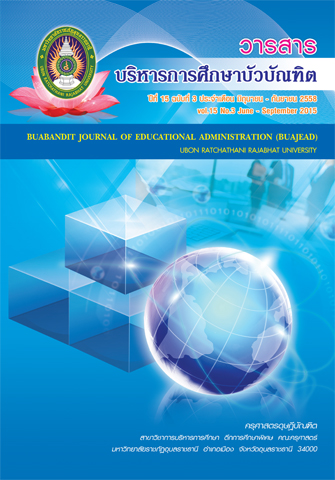ความสัมพันธ์เชิงสาเหตุของรูปแบบองค์การอัจฉริยะกับคุณภาพของโรงเรียน สังกัดสานักงานเขตพื้นที่การศึกษาประถมศึกษาในภาคตะวันออกเฉียงเหนือ
Main Article Content
บทคัดย่อ
การวิจัยครั้งนี้มีวัตถุประสงค์เพื่อศึกษาองค์ประกอบของรูปแบบองค์การอัจฉริยะของโรงเรียน ประถมศึกษาและศึกษาความสัมพันธ์เชิงสาเหตุของรูปแบบองค์การอัจฉริยะกับคุณภาพของโรงเรียนประถมศึกษา วิธีวิจัยแบ่งเป็น 2 ระยะ คือ
ระยะที่ 1 การศึกษาองค์ประกอบของรูปแบบองค์การอัจฉริยะในโรงเรียนประถมศึกษา กลุ่มตัวอย่าง เป็นผู้บริหารโรงเรียน 385 คน โดยการสุ่มอย่างง่าย เครื่องมือที่ใช้ในการวิจัยเป็นแบบสอบถามแบบมาตราส่วน ประมาณค่า 5 ระดับ สอบถามเกี่ยวกับสภาพการปฏิบัติในโรงเรียนตามรูปแบบองค์การอัจฉริยะที่ผู้วิจัยพัฒนาขึ้น จากการทบทวนทฤษฎีและงานวิจัย มีค่าความเชื่อมั่น 0.98 วิเคราะห์ข้อมูลด้วยโปรแกรมสถิติสาเร็จรูปทาง สังคมศาสตร์
ผลการวิจัยพบว่า องค์การอัจฉริยะ มี 5 องค์ประกอบคือ การใช้เทคโนโลยีสารสนเทศและการสื่อสาร การจัดการความรู้ การใช้แนวคิดองค์การแบบมีชีวิต การเป็นองค์การแห่งการเรียนรู้และการใช้การกระจาย ภาวะผู้นำ
ระยะที่ 2 การศึกษาความสัมพันธ์เชิงสาเหตุของรูปแบบองค์การอัจฉริยะกับคุณภาพของโรงเรียน ประถมศึกษา กลุ่มตัวอย่างเป็นผู้บริหารโรงเรียน 295 คน เลือกโดยการสุ่มอย่างง่าย เครื่องมือที่ใช้ในการวิจัย คือ (1) แบบสอบถามเกี่ยวกับองค์ประกอบองค์การอัจฉริยะทั้ง 5 ตามผลการวิจัยระยะที่ 1 (2) แบบบันทึกผล การประเมินคุณภาพโรงเรียนของ สมศ. การวิเคราะห์ข้อมูลใช้โปรแกรมลิสเรล
ผลการวิจัยพบว่า รูปแบบองค์การอัจฉริยะมีความสัมพันธ์เชิงสาเหตุในทางบวกกับคุณภาพของ โรงเรียนประถมศึกษาและเป็นความสัมพันธ์ในระดับมาก (rxy 0.89) โดยรูปแบบองค์การอัจฉริยะมีอิทธิพลต่อ คุณภาพของโรงเรียนร้อยละ 79
The Causal Relationship Between Intelligent Organization Model and School Quality under the Office of Primary Education Service Areas In the Northeast
The purposes of this research were to study the factors of intelligent organization model in primary schools and study a causal relationship between intelligent organization model and primary schools quality. The research was divided into 2 phases.
Phases 1 to study the factors of intelligent organization model in primary schools. The sample group used in this study comprised 385 administrator selected by Sample Random Sampling. The research instrument was the questionnaire, five rating scale index reliability of 0.98. On the practice in schools as a form of intelligent organization. Data were analyzed by using Statistical Package for the Social Sciences
The research results found that intelligent organization has 5 components: information communication and technology, knowledge management, organic organization, learning organization and distributed leadership.
Phase 2 study a causal relationship model, intelligent organization with the quality of education. The sample consisted of 295 school administrators who were selected by simple random sampling. The instrument used in the research are: (1) a questionnaire on the composition of the five intelligent organization according to the results of the Phase 1 data collection by mail (2) the quality of the school’s records forms the results of the third round external assessment by Web of schools in the sample group. Data were analyzed using by LISREL
The research results found that: The intelligent organization model has causal relationship positively to the quality of primary school and in a rather high level (rxy0.89) by intelligent organization model influencing the school quality of 79 %

